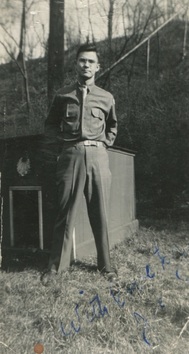 Joe Rice, 1942
Joe Rice, 1942 In honor of Veteran’s Day and all who serve and have served our country, I offer this post about my father, Joe Rice (1918 - 2011) and his father, Joseph Rice (or Josef Reisz, 1882 - 1970), both of them veterans of several foreign wars.
My father served with the US Army Air Force, 1107th Base Unit, during World War II. In September of 1942 he was a UC Berkeley art student and ordered to report to the Presidio at Monterey. Before shipping out, he and my mother June rode the train to Colorado Springs where they were married at the Army base in a group ceremony along with other enlisted men and their brides. Dad was then sent overseas where he served in Italy during the battles of Rome and Arno.
(The United States Army Air Forces (USAAF or AAF) were the military aviation service of the United States of America during and immediately after World War II, successor to the United States Army Air Corps and the direct predecessor of the United States Air Force.)
My father served with the US Army Air Force, 1107th Base Unit, during World War II. In September of 1942 he was a UC Berkeley art student and ordered to report to the Presidio at Monterey. Before shipping out, he and my mother June rode the train to Colorado Springs where they were married at the Army base in a group ceremony along with other enlisted men and their brides. Dad was then sent overseas where he served in Italy during the battles of Rome and Arno.
(The United States Army Air Forces (USAAF or AAF) were the military aviation service of the United States of America during and immediately after World War II, successor to the United States Army Air Corps and the direct predecessor of the United States Air Force.)
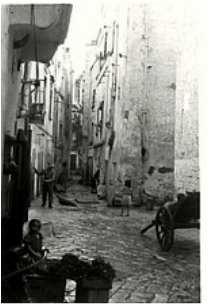 Italy, 1942 - 1945
Italy, 1942 - 1945 Joe Rice was honorably discharged in November of 1945. He was awarded the American Campaign Medal; European, African, Middle Eastern Campaign Medal; Good Conduct Medal and Victory Medal. Pay records show he received $804.19 for his service and a mustering-out payment of $300. The first of my parent’s four children was born in 1946. Dad returned to college on the GI bill, eventually earning a teaching credential and an MFA in Painting from the College of Arts and Crafts in Oakland (now the CA College of the Arts).
I have been told that the Italian campaign suffered some of the heaviest European casualties of the war (for both sides); father rarely spoke of his time in Italy or of the war, but then he wasn’t a big talker in general. One memento he brought home is a set of beautifully carved and painted figurines of Snow White and the Seven Dwarves, which throughout my childhood made an appearance once a year at Christmas. Mother now has them at the memory care facility where she lives in the Sierra foothills.
I have been told that the Italian campaign suffered some of the heaviest European casualties of the war (for both sides); father rarely spoke of his time in Italy or of the war, but then he wasn’t a big talker in general. One memento he brought home is a set of beautifully carved and painted figurines of Snow White and the Seven Dwarves, which throughout my childhood made an appearance once a year at Christmas. Mother now has them at the memory care facility where she lives in the Sierra foothills.
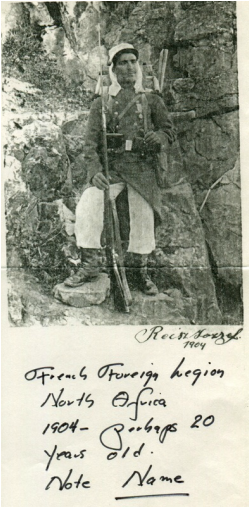
My grandfather served in several wars. He lived the majority of his adult life in the Philippines, including after my father and his sister came to San Francisco with their mother Esther aboard a US military transport ship in the early 30s. For this reason, much of the information on my grandfather is second and third hand. A Veteran’s Day article from the Pacific Stars & Stripes (“Reflections of the Oldest Army Vet in Japan,” November 11, 1963) was particularly helpful in piecing together some of my grandfather’s past service record.
At the time the article was written the elder Joseph Rice was 81 and reportedly the oldest Army veteran in Japan. Born in Hungary in 1882 and orphaned at an early age, he began his uniformed career in the French Foreign Legion in 1899. After a five-year hitch with the legion in North Africa, he sailed to the US to see the 1904 St. Louis World's Fair (and his brother Samuel who was living there at the time) where he reportedly saw the US Army 16th Infantry Regiment marching in a parade and was inspired to enlist. In 1911 he was assigned to the Philippines. From there he traveled with the US Expeditionary Forces to Siberia, China and Japan.
It was during this time that he met my grandmother in Tientsin, China. When they married he was 31 and she 15. By age 20, she had three children, my father being the youngest.
At the time the article was written the elder Joseph Rice was 81 and reportedly the oldest Army veteran in Japan. Born in Hungary in 1882 and orphaned at an early age, he began his uniformed career in the French Foreign Legion in 1899. After a five-year hitch with the legion in North Africa, he sailed to the US to see the 1904 St. Louis World's Fair (and his brother Samuel who was living there at the time) where he reportedly saw the US Army 16th Infantry Regiment marching in a parade and was inspired to enlist. In 1911 he was assigned to the Philippines. From there he traveled with the US Expeditionary Forces to Siberia, China and Japan.
It was during this time that he met my grandmother in Tientsin, China. When they married he was 31 and she 15. By age 20, she had three children, my father being the youngest.
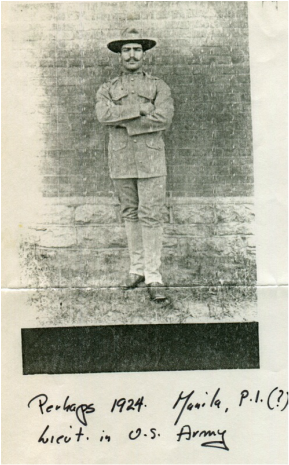
Grandfather had a known facility with languages. He quickly learned the languages of the countries where he served, along with the French, German and Hebrew he had acquired in younger years. He attributed his multi-lingual ability with earning him a commission as a First Lieutenant when the US entered WWI.
After WWI, the senior Rice left the service and bought a farm near Manila. With the advent of WWII, he left his farm for the mountains to escape capture, where, as he told the Stars & Stripes reporter, he worked behind enemy lines to organize and advise patriotic guerilla forces. He was commissioned a major in the Luzon Guerrilla Army Forces. When the US liberated the islands, he became an advisor to senior US Army officials. After the war he was chief of a private police force in the Philippines, a job from which he retired from in 1961.
At the time of his death in Japan, my grandfather was living with a daughter (presumably a half-sister to my father) and two grandsons. The Stars & Stripes article does not mention the family that preceded this one, the wife and children who set sail for San Francisco in 1931. The article does mention a 450-page manuscript on his experiences.
“Someday,” Joseph Rice is reported to have said, “I hope to have it published. Right now, I want to stay with my daughter and two grandsons.”
My grandfather visited the United States several times to see his children and he corresponded with Esther until her death. The possible existence of a lost manuscript is but another detail in a life left mostly mysterious to much of his American family.
After WWI, the senior Rice left the service and bought a farm near Manila. With the advent of WWII, he left his farm for the mountains to escape capture, where, as he told the Stars & Stripes reporter, he worked behind enemy lines to organize and advise patriotic guerilla forces. He was commissioned a major in the Luzon Guerrilla Army Forces. When the US liberated the islands, he became an advisor to senior US Army officials. After the war he was chief of a private police force in the Philippines, a job from which he retired from in 1961.
At the time of his death in Japan, my grandfather was living with a daughter (presumably a half-sister to my father) and two grandsons. The Stars & Stripes article does not mention the family that preceded this one, the wife and children who set sail for San Francisco in 1931. The article does mention a 450-page manuscript on his experiences.
“Someday,” Joseph Rice is reported to have said, “I hope to have it published. Right now, I want to stay with my daughter and two grandsons.”
My grandfather visited the United States several times to see his children and he corresponded with Esther until her death. The possible existence of a lost manuscript is but another detail in a life left mostly mysterious to much of his American family.
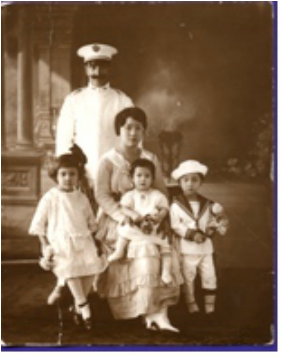
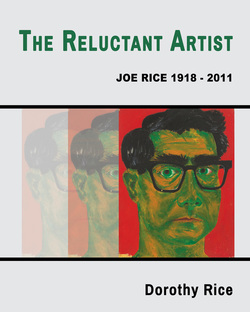
 RSS Feed
RSS Feed
